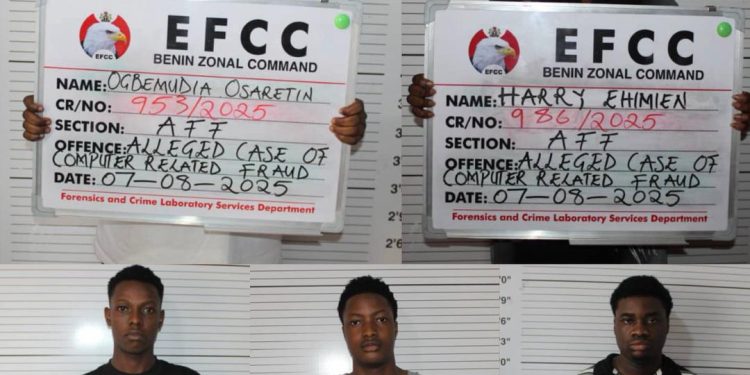By Nkechi Eze
The Benin Zonal Directorate of the Economic and Financial Crimes Commission (EFCC) has secured the conviction of five internet fraudsters before Justice M. Itsueli of the Edo State High Court sitting in Benin City. The judgment, delivered on Wednesday, August 13, 2025, came after a series of prosecutions on separate one-count charges bordering on impersonation, obtaining by false pretence, retention of proceeds of crime, and possession of fraudulent documents.
EFCC spokesperson, Dele Oyewale, disclosed in an official statement that the convicts are Ayo Korede, Ogbemudia Osaretin, Harry Ehimien, Osasumwen Osahenator, and Efosa Richard. Each of them was arraigned individually on charges tailored to their specific offences.
One of the charges, brought against Ogbemudia Osaretin, read: “That you, Ogbemudia Osaretin (m), on or about the 31st of July, 2025 within the jurisdiction of this Honourable Court, did have in your possession, in your iPhone 14 Pro Max, documents which you knew or ought to have known contained a false pretence and thereby committed an offence contrary to Section 6 and 8 of the Advance Fee Fraud and Other Fraud Related Offences Act 2006 and punishable under Section 1(3) of the same Act.”
Upon arraignment, all five defendants pleaded guilty to their respective charges. The prosecution team, comprising I.M. Elodi, I.K. Agwai, K.Y. Bello, A.A. Ibrahim, Ibrahim Faisal, and M.S. Dahiru, urged the court to convict and sentence the offenders in line with the provisions of the law. Their defence counsel, however, pleaded for leniency, stressing that the convicts had expressed remorse and were ready to turn a new leaf.
Justice Itsueli consequently convicted and sentenced Korede, Osaretin, Osahenator, and Richard to two years’ imprisonment each, with an option of paying a fine of N200,000 each. Ehimien received a similar two-year sentence, with an option of paying N100,000 or undertaking community service.
In addition to the sentences, all convicts forfeited their mobile phones, laptop computers, and balances in their bank accounts, identified as tools and proceeds of crime to the Federal Government. They also signed written undertakings to be of good behaviour henceforth.
According to the EFCC, the convicts were arrested following credible intelligence linking them to various forms of online fraud. Operatives of the Commission’s Benin Zonal Directorate carried out the arrests, leading to investigations that culminated in their arraignment and subsequent conviction.
















